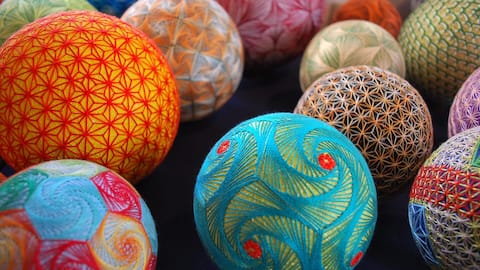Exploring Temari: Japan's timeless craft of handcrafted embroidered balls
What's the story
Temari, meaning "handball" in Japanese, is a traditional craft that features beautifully embroidered balls. Originating from China over a thousand years ago, Temari was introduced to Japan during the 7th century, where it evolved into a cherished folk art. Initially made as toys, Temari balls gradually transformed into intricate, symbolic gifts, often presented during special occasions like New Year's celebrations and weddings.
Plaything
History and evolution of Temari
Temari originated over a thousand years ago as simple toys made from old kimonos and fabric scraps. Initially a plaything for children, the craft later became a symbol of elegance, especially among the upper classes in Japan. Over time, the art form spread to households and was passed down through generations. The practice became a symbol of love, care, and craftsmanship.
Meticulous skill
Crafting process of Temari
Crafting a Temari ball starts with a core, traditionally made from fabric or rice husks. This base is embroidered with intricate geometric patterns using brightly colored cotton threads, hand-dyed with natural ingredients like plants and flowers. The artisan divides the ball into precise sections, ensuring symmetry. Each design highlights the maker's craftsmanship, turning an ordinary ball into a beautiful work of art.
Deeper meaning
Symbolism and meaning
Temari is steeped in symbolism, with each ball often representing good fortune, happiness, and health. Historically, mothers crafted Temari for their children, embedding personal wishes within the design. The patterns—featuring flowers, stars, or geometric shapes—carry deeper meanings, symbolizing beauty, guidance, and prosperity. Some Temari even include small bells or charms, enhancing their significance and creating a tactile, meaningful gift.
Meditative practice
Modern-day Temari
In modern Japan, Temari has transcended its original role as a toy, becoming a respected art form. Contemporary artists explore new designs and techniques while preserving its traditional roots. Temari-making workshops are popular both in Japan and globally, offering a mindful, meditative practice. Today, these intricately embroidered balls are often admired as decorative art pieces that celebrate Japanese culture and craftsmanship.
